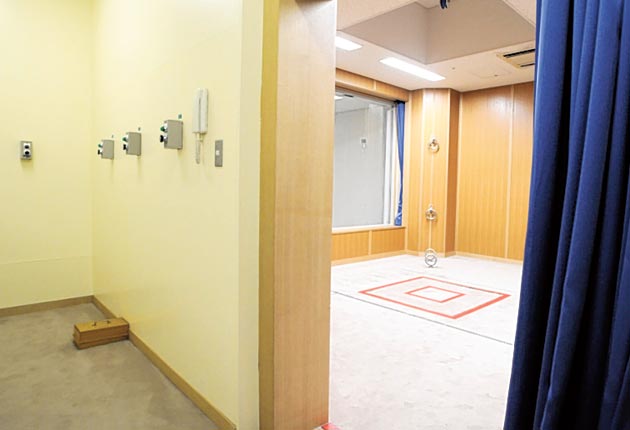Japan opens up its secret death chamber to the world

Your support helps us to tell the story
From reproductive rights to climate change to Big Tech, The Independent is on the ground when the story is developing. Whether it's investigating the financials of Elon Musk's pro-Trump PAC or producing our latest documentary, 'The A Word', which shines a light on the American women fighting for reproductive rights, we know how important it is to parse out the facts from the messaging.
At such a critical moment in US history, we need reporters on the ground. Your donation allows us to keep sending journalists to speak to both sides of the story.
The Independent is trusted by Americans across the entire political spectrum. And unlike many other quality news outlets, we choose not to lock Americans out of our reporting and analysis with paywalls. We believe quality journalism should be available to everyone, paid for by those who can afford it.
Your support makes all the difference.One of the world's most secret execution rooms was opened up to reporters for the first time yesterday, the likely first step in a long-delayed debate on Japan' s controversial death penalty.
The Justice Minister, Keiko Chiba, who opposes the death penalty, ordered the ministry's conservative bureaucrats to allow the press to visit Tokyo Detention Centre to stimulate public debate on hanging.
A select group of reporters was allowed to take pictures of the execution chambers, including the room where prisoners are hanged.
Visitors have only been allowed to see the gallows on three occasions. In each case they were members of parliament who were forced to surrender recording and photographic equipment before their visit. What little is known about the centre comes mainly from former prison guards.
Last month, Ms Chiba became the first justice minister to witness an execution when she sat grey-faced through the hangings of Kazuo Shinozawa, 59, and Hidenori Ogata, 33. The decision caught many people by surprise – Ms Chiba was widely expected to begin a moratorium on the death penalty.
Yesterday she said she hoped her actions would help the public decide on the system's merits. "It was the most open we could be, after considering the feelings of death row inmates, those who are close to them and prison guards as well as security problems."
Footage of the facility released by the state broadcaster NHK showed an anteroom with chairs, a large Buddhist altar and low table, where the execution order is read to the condemned. In a second room, a blue curtain conceals an observation chamber and a platform with a trapdoor marked in red. Some reporters said the entire facility was chilled by air-conditioners and smelled of incense.
Foreign reporters were banned from the tour, which did not show the hangman's noose or the area where the body is collected beneath the trapdoor – a concrete basement with little except a drain to catch the excretions of a thrashing or dead body. Reporters were told that inmates sometimes sip tea in the anteroom as the execution order is read out, before writing a final will.
"It's not a complete opening up because the rope wasn't shown," said Nobuto Hosaka, a former MP and campaigner against the death penalty. "The ministry knows that it's just too raw and would reveal the essential cruelty of what goes on." Last week Mr Hosaka said the facility looked like a "lounge in an expensive hotel" where "life and death are separated by a trap door".
A total of 107 people wait on Japan's death row, and many are aging and thought to be senile. The condemned include 84-year-old Masaru Okunishi, who has protested his innocence of poisoning five women for over four decades. Of the over 30 people who have been hanged since January 2006, five were in their seventies. It is not unheard of for some inmates to be ferried to the gallows in wheelchairs. At least five are mentally ill, according to Amnesty International.
Some surveys put public support for executions as high as 85 per cent. A fresh poll commissioned by NHK found support at 57 per cent, with 8 per cent opposed. "It's true that surveys find high public support for the death penalty, but most people don't have enough information to make such a choice," said Yuji Ogawara, a former head of the Japan Federation of Bar Associations, which wants executions scrapped. "If they had more information, I believe opposition would be much stronger."
Join our commenting forum
Join thought-provoking conversations, follow other Independent readers and see their replies
Comments